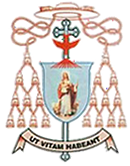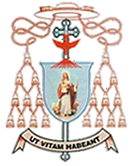- +234 9070497007
- info@archbishopvalokeke.org
EPIPHANY OF THE LORD (2008 YEAR A)
BLESSING OF AN ABBESS @ UMUOJI MONASTERY.
Readings:
Is. 60: 1-6.
The exiles return to Jerusalem from Babylon to behold their city in ruins. The prophet cheers them up with a vision of restored city. Gentiles come from distant places attracted by the splendor of the city. The light has now come and the glory of the Lord has been revealed.
This reading fits into the Christian interpretation of Epiphany. First, the Incarnation replaces the return from Babylonian Exile as God’s great act of salvation. In the revelation of God in Christ, the light has shone in darkness and the glory of the Lord had risen upon the world. Gentiles respond symbolized by the Magi.
Responsorial Psalm (Ps. 71).
The Psalm is a coronation hymn – for Davidic king. In contrast to the neighbouring oriental monarchies, the king of Israel is a source of justice and compassion for the poor. All kings coming from afar to do homage is expressive of Judah’s hope that it will become a top nation under the new king.
2nd Reading: Col. 3: 12-17.
This reading, which is chosen because of the Blessing of the Abbess, calls us to be clothed in compassion, in generosity, humility, gentleness and patience. Bear with one another, forgive each other. Above all, put on love. Sing psalms of praise and you will have peace.
2nd Reading of Epiphany is Ephesians 3: 2-3a, 5-6.
Here, Paul preaches the mystery that was hidden from all eternity. Gentiles are co-heirs with the Jews. Gentiles share with the Jews, the salvation won by Christ.
Gospel: Matt. 2: 1-12.
The magi – the three kings come from a far country to seek and pay homage to Christ the new born king of the Jews, while the Jewish authorities rejected him.
All the readings and the feast of Epiphany teach us – the universality of the gospel and the revelation of God in history.
What is Epiphany?
An Epiphany is the visible manifestation of a divine being. (A being considered invisible through ordinary observation). In Greek, epiphany or theophany designates a manifestation of a divinity and later important events in the life of a king. Such events as his birth, his ascension to the throne, and his visit to a city. In time, anniversaries of such epiphanies were kept. The word was soon used in Christian circles for the miracles of Christ as manifestations of Divine power. For some time because Baptism or enlightenment was conferred on this day it was called the Feast of Lights. In fact, liturgical use of the word embraces all the above.
In Christian Tradition, Epiphany originated in the Eastern Church, where it was primarily a celebration of the Lord’s baptism. This was interpreted as the first of his epiphanies. Later, other epiphanies were added, for example, the miracle at Cana. Such that by the 4th Century the feast embraced:
i. The Birth of Christ
ii. The Baptism of the Lord
iii. The Adoration of the Magi and
iv. The Miracle at Cana.
When the feast spread to the West, it assimilated some of the Western traditions. For example, the Magi came to be seen as representing the gentiles. Hence, the feast became primarily a commemoration of the visit of the magi, showing universality of Christ’s mission.
Who were the Magi?
They were originally a Median tribe. The Medes were part of the Persian Empire. They tried to overthrow the Persians and substitute the power of the Medes but failed. From that time they dropped political ambition for power and prestige, devoted time to prayer and learning and became a tribe of priests. They became teachers and instructors of the king and became men of holiness and learning, and wisdom. They were wise. They were no kings and might not have been rich but they were wise. They recognized Christ as the King of the universe; the King of the world.
Therefore, today’s celebration is the revelation of God in Christ and the universality of that revelation. It is good to ask, what does Christ mean to me? You recognize him as what?
* what are the symbolisms of the gifs and other roads?
The Gifts: Gold, Frankincense and Myrrh.
1. Gold, the king of metal is the proper gift for the king of men (the best is to be given to God).
2. Frankincense, the gift for a God and priests. It is the function of a priest to open the door, the way to God. Christ is the way. The Latin word for priest is pontifex, which means, bridge-builder. The divine and priestly nature of this king is revealed.
3. Myrrh is for embalmment – showing that this king is to die sometime.
Major Lessons for us:
1. God is faithful. What he promised through the prophet Isaiah he has fulfilled in Christ.
2. Manifestation of the divine has always been present in history. If we have the eyes of faith we will see the divinity which is often nearer than we imagine.
3. The Magi relinquished political and worldly ambition, devoted themselves to prayer, holiness and learning and God gave them wisdom and divine revelation. They communed with the gods and achieved the impossible. They had access to hidden knowledge and divine power. We can achieve the same by being less worldly.
1. Give your best to God. He deserves the best and you will receive the best in return. They gave their best and were saved through their dream.
2. Go back by another road and avoid the evil king. Discover the evil king in your life and avoid him/it. After you have worshipped Christ, accepted him as the king of kings, then do not go back to Herod.
3. What does Christ mean to you? What does the monastery mean to you? The right attitude matters. Paul tells us. See your call in Christ as a privilege. Seek the virtues of compassion, generosity, humility, gentleness and patience. Above all, cap it with love. Then you will savour the sweetness of the Lord and the glory of the Lord will shine in you.
May the Lord be praised both now and forever. Amen.
Address List
- Onitsha Catholic Secretariat. Basilica Of The Most Holy Trinity. P.O.Box 411, Onitsha
- +2348021818008
-
contact@archbishopvalokeke.org
Social Networks
- Archbishopval
- @AbvalOkeke
- archbishopvalerianokeke
- Onitsha Archdiocese

